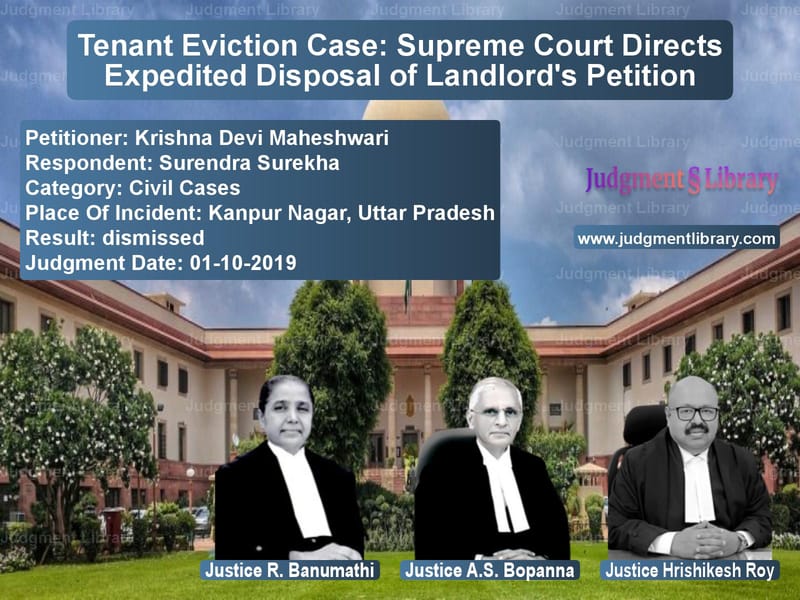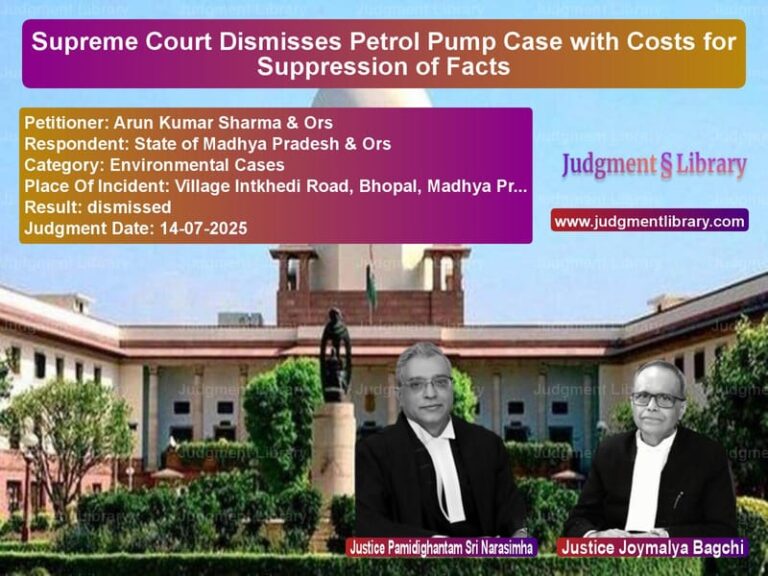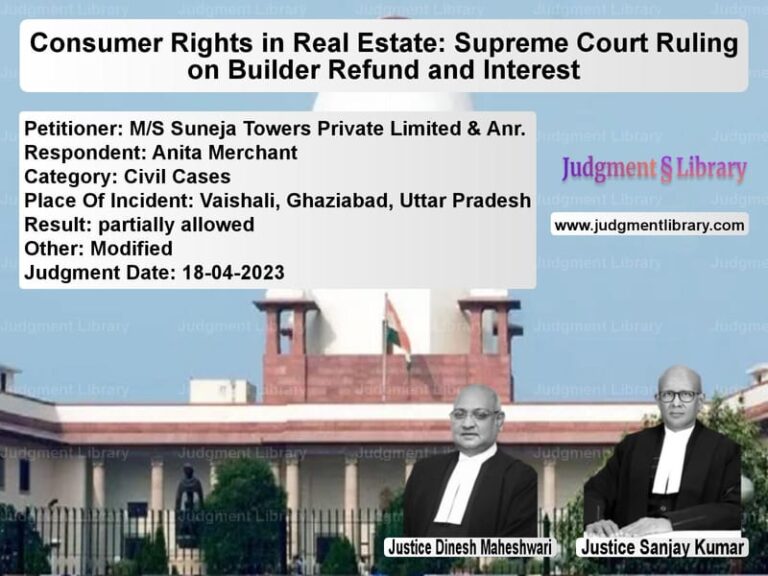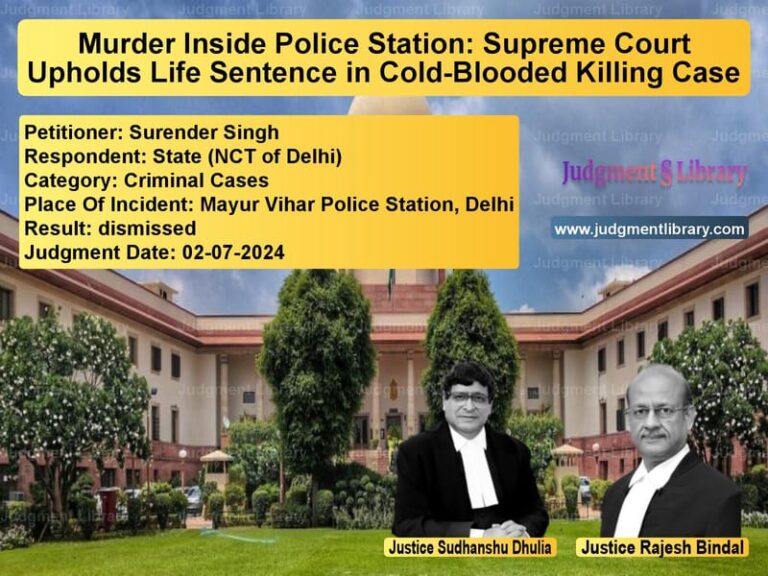Tenant Eviction Case: Supreme Court Directs Expedited Disposal of Landlord’s Petition
The case between Krishna Devi Maheshwari (landlord) and Surendra Surekha (tenant) revolves around a long-standing dispute over the eviction of a tenant from a rented property in Kanpur Nagar, Uttar Pradesh. The case highlights the challenges landlords face in recovering their property and the procedural delays often encountered in tenancy disputes. The Supreme Court’s ruling underscores the importance of timely adjudication and prevents unnecessary adjournments that delay justice.
Background of the Case
Filing of Eviction Petition
The appellant, Krishna Devi Maheshwari, filed an eviction petition under Section 21(1)(a) of the U.P. Urban Building (Control of Letting of Rent and Eviction) Act, 1972. The eviction was sought for the personal use of the appellant’s son, who is a practicing advocate.
Ex-Parte Eviction Order
On 05.09.2012, the Prescribed Authority passed an ex-parte eviction order against the respondent-tenant. The appellant argued that the respondent had deliberately delayed the proceedings by continuously filing adjournment applications, thereby obstructing the resolution of the dispute.
Tenant’s Challenge to Eviction Order
Following the ex-parte eviction order, the respondent-tenant filed an application to set aside the order, which was allowed by the Prescribed Authority/ACMM-IX, Kanpur Nagar, on 20.08.2015. This decision permitted the tenant to file a written statement upon payment of a nominal cost of Rs. 2500.
Landlord’s Writ Petition
Aggrieved by this order, the landlord filed a writ petition (C.M.W.P. No. 48964 of 2015) before the High Court, challenging the setting aside of the ex-parte order. The landlord also sought to amend the prayer to include a challenge to a subsequent order dated 25.08.2015.
High Court’s Decision
The High Court dismissed the writ petition on 15.09.2015, reasoning that the tenant had been granted an opportunity to file a written statement. However, it directed both parties to avoid unnecessary adjournments to ensure the case proceeded without further delay.
Supreme Court Proceedings
Petitioner (Landlord) Arguments
- The tenant intentionally prolonged the case by repeatedly seeking adjournments and filing applications.
- The eviction was sought for genuine personal use, and the delay was causing undue hardship to the landlord.
- Despite an ex-parte order in favor of the landlord, the lower courts continued to allow the tenant to delay the process.
Respondent (Tenant) Arguments
- The tenant was entitled to a fair hearing and an opportunity to present a defense.
- The setting aside of the ex-parte order was justified, as eviction would have been granted without hearing the tenant’s side.
Supreme Court’s Ruling
The Supreme Court, after reviewing the facts, refused to interfere with the High Court’s order. However, it took into account the landlord’s grievances and directed the Rent Court to expedite the case.
The Court observed:
- “Considering the facts and circumstances of the case and having regard to the fact that an opportunity has been provided to the respondent-tenant to file the written statement, we are not inclined to interfere with the impugned order.”
- “However, taking note of the conduct of the respondent-tenant and the facts and circumstances of the case, we direct the Rent Court-Prescribed Authority/ACMM-IX, Kanpur Nagar, U.P., to take up Rent Case NO.1 of 2012 at an early date and dispose of the same within a period of two months from the date of receipt of copy of this order.”
- “The respondent-tenant shall render all cooperation and in case the respondent-tenant does not cooperate for an early disposal of Rent Case No.1 of 2012, as ordered by this Court, learned Rent Court/Prescribed Authority shall proceed with the matter in accordance with the law and dispose of the same within two months.”
Key Takeaways from the Judgment
- Tenant Rights vs. Landlord’s Right to Eviction: While tenants have the right to defend their occupation, landlords should not face undue delays in recovering property for genuine personal use.
- Ex-Parte Orders and Procedural Fairness: The Supreme Court recognized that setting aside an ex-parte order can be justified, but it must not be misused to prolong litigation.
- Judicial Efficiency and Timely Adjudication: The Supreme Court’s directive to dispose of the case within two months highlights the need for expeditious resolution of tenancy disputes.
- Abuse of Adjournments: The ruling discourages unnecessary adjournments and misuse of procedural tactics to delay eviction.
Conclusion
The Supreme Court’s decision in this case underscores the balance courts must maintain between protecting tenant rights and preventing landlords from facing indefinite delays in recovering possession of their property. By directing a speedy resolution, the judgment serves as a precedent for ensuring efficiency in rent control disputes and preventing misuse of adjournments to frustrate genuine claims.
Petitioner Name: Krishna Devi Maheshwari.Respondent Name: Surendra Surekha.Judgment By: Justice R. Banumathi, Justice A.S. Bopanna, Justice Hrishikesh Roy.Place Of Incident: Kanpur Nagar, Uttar Pradesh.Judgment Date: 01-10-2019.
Don’t miss out on the full details! Download the complete judgment in PDF format below and gain valuable insights instantly!
Download Judgment: Krishna Devi Maheshw vs Surendra Surekha Supreme Court of India Judgment Dated 01-10-2019.pdf
Direct Downlaod Judgment: Direct downlaod this Judgment
See all petitions in Property Disputes
See all petitions in Landlord-Tenant Disputes
See all petitions in Specific Performance
See all petitions in Contract Disputes
See all petitions in Judgment by R. Banumathi
See all petitions in Judgment by A. S. Bopanna
See all petitions in Judgment by Hrishikesh Roy
See all petitions in dismissed
See all petitions in supreme court of India judgments October 2019
See all petitions in 2019 judgments
See all posts in Civil Cases Category
See all allowed petitions in Civil Cases Category
See all Dismissed petitions in Civil Cases Category
See all partially allowed petitions in Civil Cases Category







